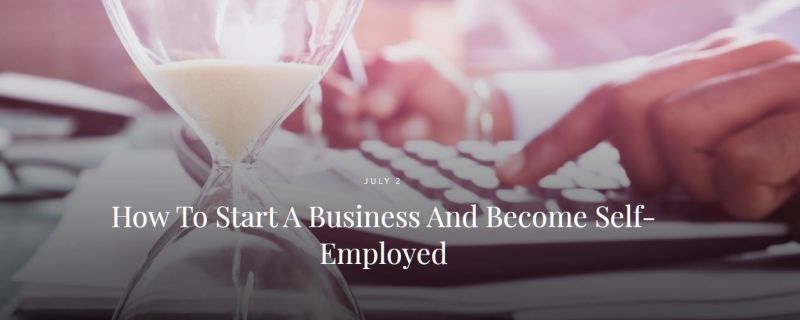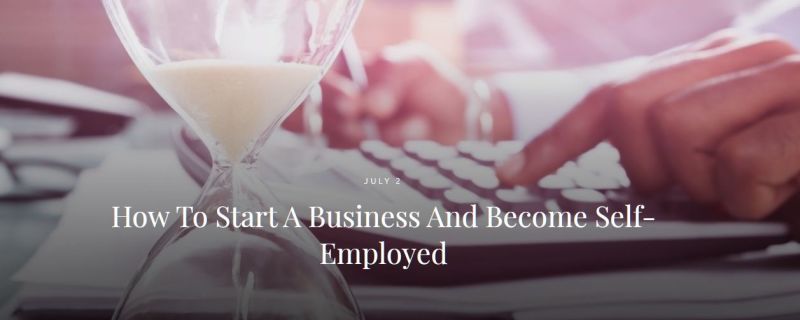
How To Start A Business And Become Self-Employed
Kathy Ennis, LittlePiggy

Working for yourself is a life-changing decision, so having a clear picture of the steps you need to take to start a business and become self-employed is essential.
I know that because I’ve been there myself (many times!)
I became a Business Mentor because I understand EXACTLY how exhilarating it feels to say goodbye to the 9-5, armed with a brilliant idea and a headful of dreams.
But I also understand the fear, uncertainty and lack of practical knowledge that is often involved in going it alone.
I’ve Never Had a Business Before and I Don’t Want to Do It Wrong!
If you’ve never started a business before, how can you be sure your idea is good enough to pay the bills? What happens if it turns out self-employment isn’t for you, after all?
You know it’s possible to make a go of it and succeed. Nearly 4.5 million people in the UK are currently self-employed, and you probably know some of them!
But right here and right now – at the start – it can like you’re standing on the edge of a cliff.
Leap and the net will appear
This is a popular saying in business, and most of the time it’s bang on for seasoned business people.
But, when you start a business and become self employed for the first time, you want to see that net before you take that leap.
That’s where preparation, planning and some basic business start up know-how comes in!
How Do You Become Self-Employed?
From a practical point of view, self-employment in the UK is as easy as telling HMRC that you’re working for yourself.
Part of the process involves registering for Self-Assessment, which is how you (or your accountant) will calculate and pay your annual tax bill.
Sole Trader Or Self-Employed – Is There A Difference?
Self-employment means you decide what work you’ll do, and how and when you’ll do it. You are also completely responsible for the results.
You are not entitled to sick or holiday pay. However, you can choose your own working hours, and you will work for more than one client (so if you need to take a morning off at short notice, or ditch that client who never pays your invoices on time, no problem!)
If you’re a sole trader, then you’re a self-employed person who is the sole owner of your business.
Sole traders can work as consultants, plumbers, graphic designers, coaches, virtual assistants, online shop owners…. just about any type of business goes.
To summarise, ‘sole trader’ describes the legal structure of your business, while ‘self-employed’ means you don’t work for an employer.
There isn’t a huge difference between the two terms, which is why they are so often used interchangeably. Self-employment doesn’t automatically make you a sole trader.
You could choose to set up a partnership instead, so you and someone else share equal responsibility for the business, or register as a limited company.
Sole Trader vs. Limited Company
Unlike a sole trader or business partnership, a limited company is a separate legal entity from its owners – even if that’s just you.
Your company will have to be formally registered at Companies House. Also, your personal finances and assets are not counted as part of the business.
You will have control over your business name. Once it’s been registered, nobody else will legally be allowed to use it!
Many new business owners start out as sole traders, then switch to limited companies later, as they become more successful and their profits increase.
What Other Self-Employment Responsibilities Should You Focus On?
I know… I know… you were hoping to move onto the more exciting parts of self-employment by now!
Things like designing a fancy website, how to chat with customers on social media, or where to find the best networking events with free snacks and coffee.
Self-employment has a list of responsibilities. Too often, people overlook them because they’ve been distracted by all that fun, frilly stuff!
The good news is that if you take care of those responsibilities right from the start, there’s much more scope for you to relax and enjoy yourself later on.
They include:
- Opening a business bank account. If you’re a sole trader you can use your personal account for business, but do you want to? It will be so much easier for you to manage your year accounts if all your business transactions are in a separate bank account.
- Organising the right insurance for the type of work you want to do. This can include policies such as professional indemnity, public liability insurance, product liability insurance, critical illness insurance etc.
- Deciding how you’ll keep accurate and up-to-date financial records.
You may also want to think about registering for VAT. You can do that voluntarily at any time. However, you must register if you expect your business turnover to be more than £85k a year (well, we can dream!)
Ultimately, Business Is A Practical Process
After years of stops and starts, it wasn’t until I focused on planning, systems, and processes, that my self-employed business finally started moving in the right direction.
At the time, it felt like I’d discovered a ‘secret formula’ for self-employment.
You have to be prepared prepared to roll your sleeves up, learn the mechanics of business. You have to pay attention to what’s going on behind the scenes – not just the glitzy stuff at the front – then your chances of success will skyrocket.
As a highly experienced Business Mentor, I will help you focus on what really matters. This means you can take that brilliant idea of yours, and turn it into the successful business you deserve!
Find out more by booking a half-hour, complimentary Breakthrough Session now
Find out more by booking a half-hour, complimentary Breakthrough Session now
You can view this original article here